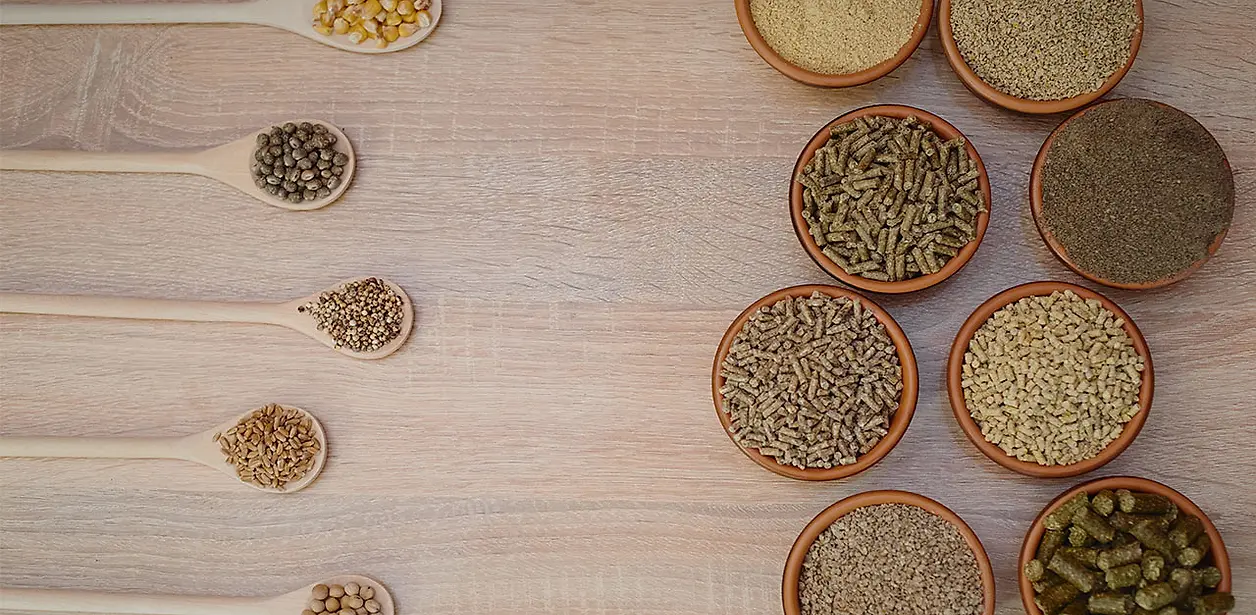ISO 50382 Ash Content Profiling in Mixed Feed
The ISO 50382 standard provides a robust framework for analyzing ash content in mixed feed products. This service is essential for quality managers, compliance officers, R&D engineers, and procurement teams who need to ensure the integrity of their product formulations.
Ash content profiling involves determining the mineral content in a feed sample, which includes elements like calcium, phosphorus, magnesium, and sodium. These minerals play critical roles in animal nutrition; they support bone health, energy metabolism, and other physiological processes. Therefore, accurate ash content analysis ensures that feeds meet nutritional specifications set by regulatory bodies such as the European Commission (EC) and the United States Food and Drug Administration (FDA).
The ISO 50382 method is particularly suited for mixed feed products, which are blends of various ingredients like grains, proteins, fats, vitamins, and minerals. These feeds are designed to meet specific nutritional requirements for different animal species. By profiling the ash content in such mixes, laboratories can verify that the proportions of these essential nutrients align with desired outcomes.
The testing process begins with sample preparation. Samples are typically taken from a representative batch of mixed feed and ground into a fine powder using an agate mortar or similar tool to ensure uniformity. The sample is then carefully weighed out according to ISO 50382 specifications, which define the amount required for accurate ash determination.
The next step involves incineration at high temperatures (typically around 600°C) in a muffle furnace or other suitable equipment designed to withstand such conditions. This process removes all organic matter from the sample, leaving only the mineral content behind as ash. During this phase, it is crucial to maintain an inert atmosphere within the furnace to prevent contamination of the sample.
After incineration, the resulting ash must be carefully collected and weighed again. The difference between the initial and final weights represents the ash content percentage by mass in the original feed sample. This value provides valuable insights into the mineral composition of the product, allowing manufacturers to adjust formulations if necessary to meet industry standards.
Accurate results from ISO 50382 testing are critical for several reasons. First, they enable compliance with international regulations governing feed safety and efficacy. For instance, certain jurisdictions may have strict limits on allowable ash levels in animal feeds due to potential health risks associated with excessive mineral content. Secondly, knowing the precise ash content helps producers optimize their ingredient mixtures, reducing costs while maintaining nutritional quality.
In addition to regulatory compliance, understanding ash content profiles can also aid in product development efforts aimed at improving feed efficiency or enhancing specific performance metrics for livestock animals. By leveraging detailed knowledge of mineral components through thorough analysis via ISO 50382 methods, researchers and engineers gain actionable data points that guide further innovation.
Compliance with international standards like ISO 50382 ensures consistency across batches produced by different facilities or suppliers worldwide. This standardization fosters trust among stakeholders involved in the supply chain—whether they are feed manufacturers themselves or buyers purchasing raw materials from third parties.
Industry Applications
| Application Area | Description |
|---|---|
| Animal Feed Manufacturing | Ash content profiling is vital for ensuring that manufactured feeds meet required specifications regarding mineral content. It helps in maintaining consistent quality across various batches produced by different plants or suppliers. |
| Supply Chain Management | Accurate ash analysis allows feed manufacturers to source raw materials consistently, ensuring that the final product remains compliant with global regulations and meets customer expectations. |
| R&D & Innovation | Understanding the mineral composition of mixed feeds through detailed profiling can inspire new formulations designed specifically for improved performance or reduced environmental impact in livestock production systems. |
| Safety Monitoring | The ability to detect variations in ash content early on allows companies to address potential quality issues promptly, thereby preventing contamination risks that could lead to recalls or reputational damage. |
Eurolab Advantages
Eurolab offers unparalleled expertise in executing ISO 50382 ash content profiling for mixed feed products. With state-of-the-art facilities and highly trained technicians, we provide reliable results that meet stringent quality control requirements.
Our comprehensive approach includes meticulous sample preparation followed by precise incineration under controlled conditions to ensure accurate measurement of mineral residues. We employ advanced analytical equipment capable of detecting even trace amounts of elements, thus providing clients with precise data they can rely on.
In addition to technical proficiency, Eurolab prides itself on delivering timely service without compromising accuracy or reliability. Our dedicated team works closely with customers throughout the entire testing process, offering guidance whenever needed and ensuring seamless communication from start to finish.
By choosing Eurolab for your ash content profiling needs in mixed feeds, you gain access not just to world-class laboratory services but also valuable insights into how your products compare against industry benchmarks. Our team leverages their extensive experience gained over decades of working with similar projects across diverse sectors, including agriculture and pharmaceuticals.
Competitive Advantage and Market Impact
Evaluating ash content accurately is crucial for maintaining competitive edge in the feed industry. By adhering strictly to ISO standards like ISO 50382, companies demonstrate their commitment to producing high-quality products that adhere to global safety guidelines.
Accurate ash profiling also facilitates better decision-making during product development stages, enabling manufacturers to refine existing formulas or introduce new innovations tailored specifically towards enhancing feed efficiency. Such advancements translate into cost savings and improved profitability for businesses operating within this competitive market space.
Furthermore, compliance with international standards enhances brand reputation among consumers who increasingly prioritize ethical sourcing practices and transparent labeling information when selecting animal feeds. This increased trust fosters long-term relationships between suppliers and customers alike, contributing significantly towards overall business success.





